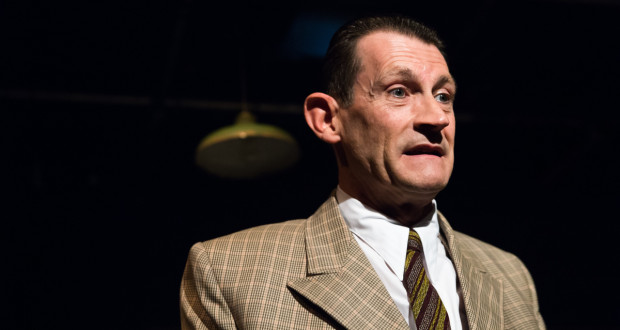Pros: Strong acting, thought-provoking writing and an interesting perspective on a familiar subject, all in a lovely venue.
Cons: The monologue format limits the emotional impact of the story. This play is skillfully staged and performed; a strong and well written story about the past, clearly relevant to today.
Summary
Rating
Excellent
Set on the eve of the Second World War, the play looks back on the complex events that have led to this moment: the atrocities of the First World War and their impact on what we now know as the interwar years. The story is told through the reminiscences of just one character: Baron Trotta, a Slovenian living in Vienna who grew up in the world of the Austro-Hungarian Empire. The play is presented as an hour long monologue where Trotta recounts his past, including the friends, family and wife he has gained and lost; stories all linked in some way to the consequences and politics of war.
The writing has an elegant feel to it. The comments and reflections on war are profound and speak strongly to a modern audience, particularly at a time when the impact of war on the lives of ordinary people is a story once again at the heart of Europe. Actor David Bromley gives a strong, very enjoyable performance as Trotta. However, I felt the monologue format at times limited the emotional impact of the play. Trotta’s relationship to others is the crux of the narrative: it’s the way through which the audience puts historical and political references into a meaningful context, which writer Howard Colyer enables very skillfully. Yet, we’re never given a chance to properly meet these characters on stage. They are implied or referenced through snippets of accents or exaggerated mannerisms, but that doesn’t bring us to the heart of these relationships and for me, this lessened the deep emotional impact which I believe the play could have achieved.
What did work really well was the sense of tension and anxiety which built up gradually throughout the performance. At the beginning Trotta appears in control: despite the turmoil outside, his manner is relaxed, almost casual. As the story unfolds and Trotta’s reflections become deeper, we see his anxiety grow. This is supported by the sound, lighting and staging, all of which work together wonderfully to make palpable the tension underpinning the action on stage. It’s a snap-shot of what it must have felt like to live through events at the time.
As a venue, the Jack Studio Theatre could not be better. A black box performance space with no distractions, it allows the audience to be fully immersed in the world of the play. Adjoined to the friendly Brockley Jack pub you could spend a very enjoyable evening in this venue with a pre or post show meal or drink. 1938 highlights a perspective on the events surrounding the two World Wars that I have personally not often seen dramatised. If, like me, you’re more familiar with the English, French and German experiences at this time, then this play will offer you an insightful exploration of the parallels and differences for those within Central and Eastern European countries.
Author: Howard Colyer, freely adapted from The Emperor’s Tomb by Joseph Roth
Director: Kate Bannister
Producer: Ballast Theatre
Booking Information: This show has now completed its run.
 Everything Theatre Reviews, interviews and news for theatre lovers, London and beyond
Everything Theatre Reviews, interviews and news for theatre lovers, London and beyond



